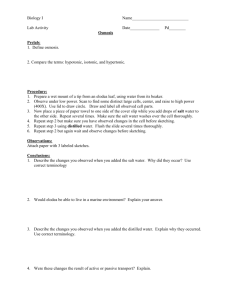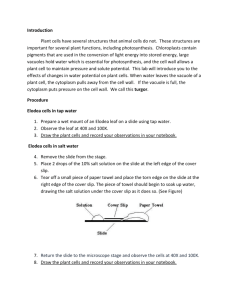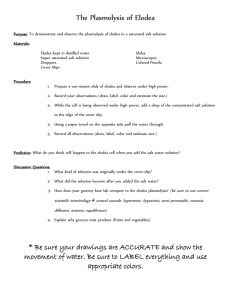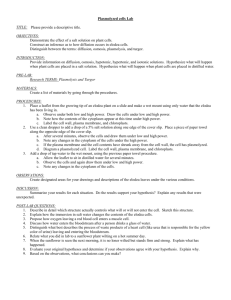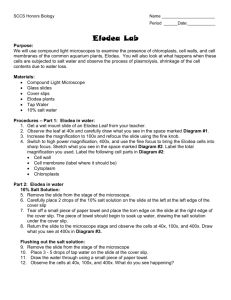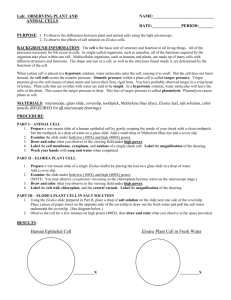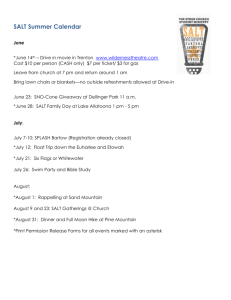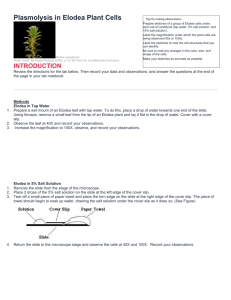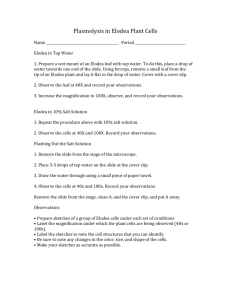How To Use This Lab Skeleton
advertisement
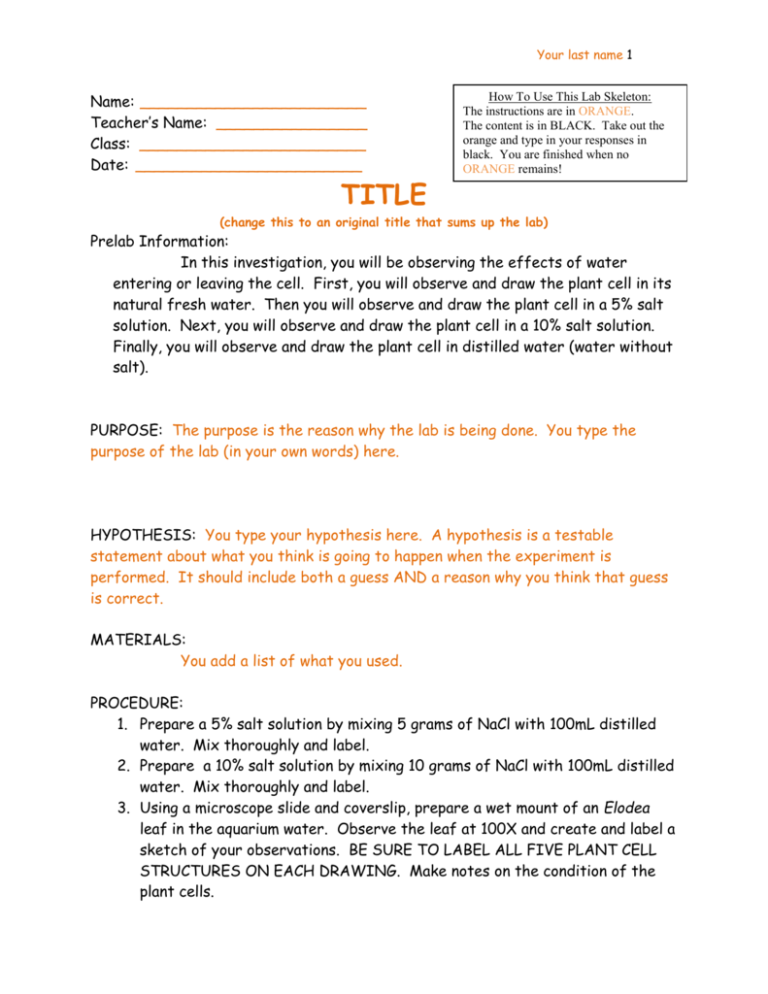
Your last name 1 Name: ________________________ Teacher’s Name: ________________ Class: ________________________ Date: ________________________ TITLE How To Use This Lab Skeleton: The instructions are in ORANGE. The content is in BLACK. Take out the orange and type in your responses in black. You are finished when no ORANGE remains! (change this to an original title that sums up the lab) Prelab Information: In this investigation, you will be observing the effects of water entering or leaving the cell. First, you will observe and draw the plant cell in its natural fresh water. Then you will observe and draw the plant cell in a 5% salt solution. Next, you will observe and draw the plant cell in a 10% salt solution. Finally, you will observe and draw the plant cell in distilled water (water without salt). PURPOSE: The purpose is the reason why the lab is being done. You type the purpose of the lab (in your own words) here. HYPOTHESIS: You type your hypothesis here. A hypothesis is a testable statement about what you think is going to happen when the experiment is performed. It should include both a guess AND a reason why you think that guess is correct. MATERIALS: You add a list of what you used. PROCEDURE: 1. Prepare a 5% salt solution by mixing 5 grams of NaCl with 100mL distilled water. Mix thoroughly and label. 2. Prepare a 10% salt solution by mixing 10 grams of NaCl with 100mL distilled water. Mix thoroughly and label. 3. Using a microscope slide and coverslip, prepare a wet mount of an Elodea leaf in the aquarium water. Observe the leaf at 100X and create and label a sketch of your observations. BE SURE TO LABEL ALL FIVE PLANT CELL STRUCTURES ON EACH DRAWING. Make notes on the condition of the plant cells. Your last name 2 4. Remove the slide from the stage of the microscope. Using a Pasteur pipette, place 2 drops of the 5% salt solution on the slide at the edge of the coverslip. Tear off a small piece of paper towel and place the torn edge on the slide at the edge of the coverslip that is opposite the side where the salt solution was placed. The piece of towel should begin to soak up water, drawing the salt solution under the coverslip as it does so. 5. Replace your slide under the microscope and observe the plant cells at 100X. Create and label a sketch of your observations. Make notes on the condition of the plant cell. 6. Repeat steps 3 through 5, replacing the salt solution with 3-5 drops of distilled water. 7. Prepare a new slide and repeat steps 3 through 6, first with a 10% salt solution and then with 3-5 drops of distilled water. DATA: Using colored pencils, markers or crayons, neatly draw your data below. Your last name 3 Elodea Cells in Aquarium Water Total magnification: ________________ Notes on the condition of the plant cell: __________________________ ________________________________________________________________ Your last name 4 Elodea Cells in 5% Salt Solution Then Distilled Water Elodea cells in ____________________ Elodea cells in ____________________ Total magnification: _______________ Total magnification: _______________ Notes on the condition of the plant cell: _ Notes on the condition of the plant cell: _ ________________________________ _______________________________ ________________________________ _______________________________ ________________________________ _______________________________ Your last name 5 Elodea Cells in 10% Salt Solution Then Distilled Water Elodea cells in ____________________ Elodea cells in ____________________ Total magnification: _______________ Total magnification: _______________ Notes on the condition of the plant cell: _ Notes on the condition of the plant cell: _ ________________________________ _______________________________ ________________________________ _______________________________ ________________________________ _______________________________ Your last name 6 CONCLUSION: Use your answers to the following Analysis Questions (which you worked out on your Rough Copy) to construct a conclusion paragraph. YOU SHOULD NOT SHOW THE QUESTIONS IN YOUR FINAL DRAFT! Your interesting and well-written paragraph should contain the answers to all of the questions below. Remember to use scientific writing (passive voice, no personal pronouns). 1. Was the hypothesis supported or rejected? Why? 2. What is the shape of the typical Elodea cell? 3. What are the small green blobs found inside of the cells? What is their function? 4. What happens to the plant cell as the salt water flows under the coverslip? 5. What happens to the plant cell when salt water is flushed out with distilled water? 6. Which of the four solutions (aquarium water, 5% salt solution, 10% salt solution and distilled water) were: a. Isotonic to the cell cytoplasm? b. Hypotonic to the cell cytoplasm? c. Hypertonic to the cell cytoplasm? 7. Which of the four solutions (aquarium water, 5% salt solution, 10% salt solution and distilled water) caused the cell to undergo: a. Cytolysis? b. Plasmalysis? c. Explain your answer. 8. What kind of water (salt, fresh or distilled) do you believe that the classroom Elodea plants are living in? What recommendations can you make to care for the plant? What should be done for it? What should NOT be done to it? Your last name 7 After you have finished writing the Conclusion, go back and write the Title. The Title should be a short statement that sums up what the entire lab was about. Be creative! The only title you can’t use, is the one your teacher is using! Last-minute check! Did you use the spellchecking feature to make sure your words are spelled correctly? Have you removed ALL of the instructions from the lab skeleton? Are you going to make sure your lab report prints neatly and is stapled in the upper-left hand corner?
